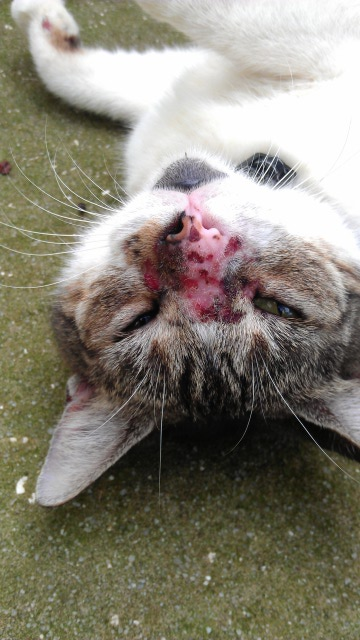QuestionHello
I have a Farrell cat that has had two sets of kittens. I was able to catch her and have her spayed. I have two remaining kittens of her second batch very young and seem to be easily socialized etc.. My concern is the first set of four. I fed them early on outside with Mamma Cat. Until I realized she was pregnant again. The kittens were about six months.I could pet them etc.. then I captured them. Took them into the vet.I got them all spayed and neutered. I have had them in the my room for the past couple months. They freak out if someone else comes in to socialize with them. They get along great with me. I need to get these great cats ready for a new home. Only seems one is really attached to me. What can I possibly do to get these cats ready for a new home! Or do I just find them an understanding patient person that will work with them in there home. One cat or a pair at a time??? The regular adoption circuit may not work because they would go in shock if they were put out in a pet store situation.
Thanks
Jerry
Confused cat Farmer Ft Worth Texas
AnswerJerry,
Have you considered consulting a holistic veterinarian to help these kittens? A holistic vet is trained in conventional medicine as well as one or more alternative therapies which might include acupuncture, homeopathy, massage or herbal medicine to name a few options. My recommendation would be to get in touch with a holistic vet who uses homeopathy in his/her practice because I've seen some pretty amazing things happen when the right cat gets the right remedy at the right time. My own veterinarian is a holistic vet who uses homeopathy in her practice and I can honestly say that she's managed to create miracles with my pets by simply recommending homeopathic remedies specifically to help improve different aspects of different cats' physical and psychological health.
I've used Bach flower remedies to help cats in my home for well over 10 years now. In this specific situation I'd recommend working with an experienced homeopathic veterinarian or certified homeopath with experience treating cats. Getting these guys ready for a home is going to take some time and patience, but it will be worth it in the end. You can start by giving three basic Bach flower remedies that should help these cats relax a bit; Mimulus to deal with specific fears #in this case new people#, Elm to encourage optimism and Rescue Remedy which is a blend of flower essences designed to calm and reassure #I've used it for cats coming from a variety of situations, it works well on under socialized, abused, abandoned, traumatized, anxious and fearful cats#. These remedies are fairly basic, the worst that will happen is absolutely nothing #unlike traditional allopathic medications, the wrong drug can cause serious side effects#.
My recommendation would be to start administering Rescue Remedy first since this remedy is designed to help with fear, anxiety, trauma, etc by calming and reassuring the cats. I've found that rubbing 4-5 drops of Rescue remedy into the relatively fur free skin on and in front of the cats' ears works when it comes to giving quick results, do be careful not to get any into the cats' ears because it may sting since the flower essences are preserved in a grape alcohol solution. After the first doses you can either continue to administer the Rescue Remedy that way when the cats are feeling particularly anxious as often as necessary, but for the most part I'd suggest adding 7-10 drops of Rescue Remedy to clean bowls of fresh water for the cats each morning. Homeopathic remedies have many advantages over allopathic medicines including the fact that homeopathic remedies don't typically have side effects, administering small or large amounts won't cause problems - if the right remedy is being given you'll see changes whether you're using tiny doses or bigger ones. Once these kitties have been getting Rescue Remedy in their water twice daily for 5 days you can go ahead and add 3-5 drops of Elm to the cats' water bowls in addition to the Rescue Remedy. When you've been giving the Rescue Remedy/Elm combination for a few days you can add Mimulus to the mix, I'd say that 3-5 drops in the water bowls will work nicely. Once you've started administering the Mimulus you can start gradually decreasing the Rescue Remedy you're adding to the cats' bowls to see how they cope - if they have difficulty coping it's perfectly okay to go ahead and continue giving the Rescue Remedy at least until you're seeing a homeopathic vet or a certified homeopath with experience treating cats. you start to see the cats progressively becoming more relaxed, then you can move on and administer the remedy every 4 hours for 3 days starting to gradually decrease the amount of Rescue Remedy the cats get and how frequently they get it over the course of a week or so. These remedies are harmless, the absolute worst thing that can happen if you're not using the right remedies is absolutely nothing, they're not addictive, they won't hurt the cats and they just might help them move forward so that they can live in loving forever families. There are a few other Bach flower remedies that I could recommend in this situation, but at this point the three remedies I've recommended are plenty.
There are a few things that it's important to understand about homeopathy:
1# Homeopathic remedies don't work instantly, they tend to gradually move the person or pet towards a state of balance.
2) Unlike drugs used in Western medicine properly prescribed and used homeopathic remedies don't suppress symptoms, the right remedy administered at the right time in the right way will actually cure the symptom it's geared towards treating.
3) Sometimes homeopathy can be somewhat like peeling an onion in the sense that you can cure one problem and another becomes immediately apparent. This is why you need to find yourself a good homeopathic vet or a certified homeopath prepared to work with your cats. If you're interested there is a homeopathic vet who volunteers in the Ask the Vet portion of this site by the name of Dr. Christine Chambreau, apparently she does consultations by phone and e-mail throughout the US #payment details need to be discussed with her#.
4) Vaccines can create physical and behavioral reactions, especially if they've been given excessively. You'll need to discuss homeopathic remedies (Thuya is typically the remedy of choice in this instance)
and dosages to treat these issues.
When it comes to placing these kitties I'd recommend having them treated by a certified homeopath, a homeopathic or holistic vet first, this will most likely improve their chances of being adopted into loving families without worrying about them being placed in shelters or euthanized because pet parents didn't know what they were getting. It's really best to help these kids get a bit further on their road to being fully rehabilitated before placing them since it really sounds like they're still quite anxious about new people - if they don't relate well to people they won't be as likely to remain in the homes that you place them in. I haven't personally seen or dealt with these guys so I can't really say for sure whether it would be best to place them in pairs or not - sometimes cats who have been through as much as these guys have do better when they're placed with a sibling, in other cases it's detrimental to place them in sibling groups because it increases fear based behaviors. If you send along descriptions of the behaviors, personality traits and specific reactions to anxiety I can try to give you an idea what would be best for these little ones. In any case whether you place these kittens in pairs or as single pets it's important that you're completely up front with prospective adoptive families about their history. I wouldn't recommend placing these cats into homes with children or homes that are loud, busy and might induce fearful behaviors. It's important not to promise anyone a kitty, take your time finding these kitties the right homes to fit their life experiences so far. I wouldn't recommend these kitties for first time pet parents, they need folks who have experience with cats, maybe even folks who have fostered or rehabilitated cats from a variety of situations. If you like I can pass along questions you should ask and specific traits you should be looking for when it comes to the people who adopt these kittens. If you have any further questions, concerns or you'd like me to clarify anything in this answer I'd be happy to help you out to the best of my ability. I wish you luck in placing these little ones into loving forever families and I'd like to hear how they're doing from time to time.

 Cat nose
QuestionCat
QUESTION: There is a stray cat in o
Cat nose
QuestionCat
QUESTION: There is a stray cat in o
 What breed/mix is my cat?
QuestionSugar and Oliver
QUESTION: Hi,
Im wond
What breed/mix is my cat?
QuestionSugar and Oliver
QUESTION: Hi,
Im wond
 What Breed Is My Cat ??
Question
Cloud1 Cloud2
Hey, my boyfriend a
What Breed Is My Cat ??
Question
Cloud1 Cloud2
Hey, my boyfriend a
 russian blue gene info
QuestionBlue Mom & kittens
QUESTION: I am fo
russian blue gene info
QuestionBlue Mom & kittens
QUESTION: I am fo
 Breed
Question
Sammy Sammy
We found this cat out
Breed
Question
Sammy Sammy
We found this cat out